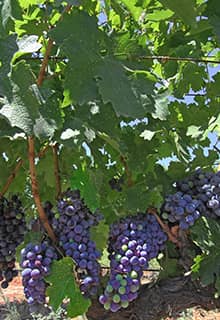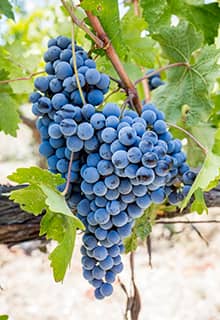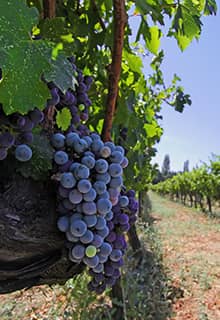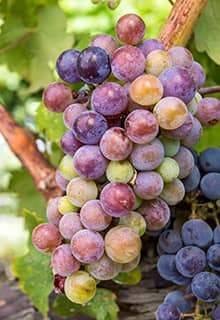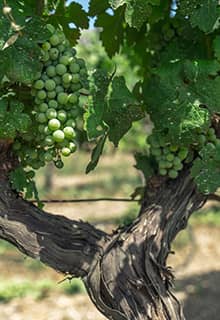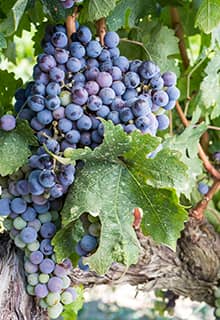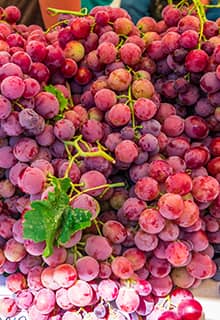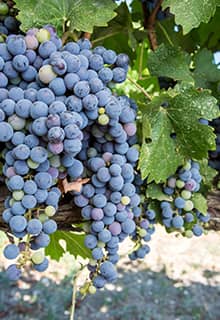

indigenous grape
varieties
Boğazkere
Boğazkere is one of the strongest and most characterful grapes grown in Türkiye. The homeland of Boğazkere is Diyarbakır in Eastern Türkiye. The wines made of the small, dark-colored, and thick-skinned Boğazkere grapes have a strong body and are suitable for aging. Sour cherry, cherry, and spice flavors can be discerned in the strong and rich taste of Boğazkere wines. It is paired perfectly with spicy meat dishes with sauces, kebabs and BBQs, kuzu tandır (slow-roasted lamb), and strong cheeses.
Öküzgözü
The Öküzgözü grape variety is grown in the villages of Elazığ and Malatya in Eastern Türkiye. This grape has large, succulent berries. The wines made of Öküzgözü grapes, which are sometimes blended with Boğazkere grapes, are balanced and low in tannins. Öküzgözü wines can be paired with casseroles, kebabs, smoked foods, Turkish eggplant dishes such as hünkar beğendi (smoked eggplant puree topped with pieces of lamb), and grilled red meats.
Kalecik Karası
The Kalecik Karası grapes are the best quality red wine grapes grown in Central Türkiye. The name derives from Ankara's Kalecik district. This grape is produced in a microclimate at an altitude of 1,000 meters. It has thick skin and round berries of a black and dark blue color. Kalecik Karası wines are a great accompaniment to pide, meat in a tomato sauce, and grilled cutlets.
Çalkarası
Çalkarası grapes are grown in Denizli in Aegean Türkiye. The berries are light red and succulent. The vineyards are found at highlands of 1,200 m altitude. When aged, Çalkarası grapes produce a slightly acidic rosé wine, which typically shows straightforward flavors of strawberry and raspberry, and a slightly floral perfume. Rosé wines produced with Çalkarası grapes can be paired with seafood and lightly spicy dishes.
Papazkarası
This grape is grown in Tekirdağ, Edirne, and Kırklareli in Thrace as both a table grape and for red wine production. Papazkarası is an ancient blue-black grape variety native to Türkiye with thick-skinned, large berries. The wine is aromatic with medium-low tannins and high acidity. Single-variety Papazkarası wines show flavors of plum, cherry, and spices.
Sultaniye
Sultaniye is the name given to the sultana (or sultanina) grape variety in Türkiye. The berries are small, succulent, with low acidity and thin skin. Sultaniye is mostly grown in Denizli, Manisa, and İzmir, and since it is seedless, it is consumed both as a table grape and as a raisin. Sultaniye grapes have light, pleasing aromas of a wide range, including green apple and citrus. It can be paired with grilled or steamed fish, shellfish, chicken.
Narince
Narince is a white grape variety indigenous to the northeastern region of Tokat and is grown along the Yeşilırmak River. The Narince grape is a delicate variety with a thin skin. Narince wines have assertive citrus flavors, are balanced with good acidity, and have good aging potential (up to ten years). Narince grapes are often blended with Emir and Sultaniye grapes. Narince wines are ideally accompanied by oily grilled fish, spicy chicken, eggplant salad, and dishes containing onions.
Emir
Emir is a juicy, light-skinned grape that is native to Türkiye's Cappadocia region, characterized by its unique microclimate. Emir wines are delicate, with an exceptionally light color and flavors of green apple and citrus. The variation between daytime and nighttime temperatures in the region's high-altitudes and the volcanic soil contribute to the local wines’ high acidity and mineral tones. Emir is blended with Narince and Sultaniye, and produces both still and sparkling wine. It pairs well with oily fish, chicken in tomato sauce, salads without vinegar, asparagus, shellfish, and dishes with creamy white sauces.
Bornova Misketi
Bornova Misketi (known as "Muscat" in Europe) is a medium-sized, aromatic, white grape grown in Bornova, İzmir. The most significant characteristic of Bornova Misketi, a thin-skinned, juicy grape with low acidity, is its aromatic structure. The berries are very delicate and have a strong aroma. The grape is also consumed as a table grape. Dry wines produced with Bornova Misketi are an excellent aperitif and ideal accompaniment to cheeses that do not overpower its flavor. It can be paired with snacks, seafood appetizers, and salads. Sweet wines go well with caramelized and cheese-based desserts, stewed quince, and cheeses such as soft aged cheeses and blue cheeses.
Foça Karası
Foça Karası, the ancestor of various grapes in Europe and the Aegean, enjoys a history that goes back approximately 2,600 years. Its color is purple and black, and the berries are round. Foça Karası is cultivated in Foça, İzmir. Research indicates that this variety has been in existence since antiquity, and was reintroduced as a result of intensive studies and research. The Foça Karası grape variety is listed in the Ark of Taste, a catalog of endangered heritage food compiled by the Slow Food movement.
Hasandede
The Hasandede grape variety is a white, thin-skinned, medium-sized grape that is cultivated in Kırıkkale. Wines made of Hasandede grapes are full-bodied and delicately perfumed with florals and citrus aromas. You can discern orange peel, green apple, and pear flavors.
Vasilaki
Vasilaki is a white grape variety with a thin-skinned berry. The grapes are small and grow in large bunches. It is used for making dry and sweet wine in Bozcaada, where the grapes ripen early. Vasilaki wines are fine, acidic white wines with aromas of citrus, cloves, and orange peel, and are not suitable for aging. Vasilaki is also listed in the Slow Food's Ark of Taste catalog.
Yapıncak
Yapıncak is a thin-skinned white grape that ripens late and grows in large clusters. It is an indigenous variety of Şarköy and Mürefte in Tekirdağ. Yapıncak grapes produce medium- and low-acidity wines with apple, pear, and quince flavors, and are suitable for sweet wine production. They are ideally accompanied by fish - especially lüfer (bluefish) and sardalya (sardines) - and soft cheeses.
Karalahna
Karalahna is a local grape of the island of Bozcaada, which is situated directly across from the city of Çanakkale in the North Aegean coast of Türkiye. The grapes are round, quite large, and thin-skinned with a very particular dark purple color. Karalahna wine has black plum, black cherry, and raspberry flavors. It has high acidity, a full body with pronounced tannins, and is well-suited for oak casks. The Karalahna variety is listed in the Slow Food's Ark of Taste catalog.

